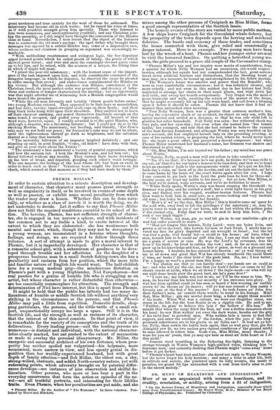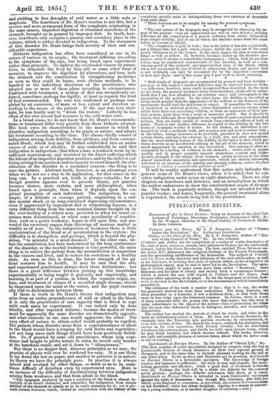DR. HUNT ON HEARTBURN AND INDIGESTION"
Mon of us are acquainted with common heartburn, and its crudity, eructation, or acidity, arising from a fit of indigestion,
• On the Severer Forma of Heartburn and Indigestion, especially those which arise from Constitutional Causes. Ily Henry Hunt, M.D., Member of the Royal College of Physicians, 8r.c. Published by Churchill.
and yielding to free draughts of cold water or a little soda or magnesia. The heartburn of Dr. Hunt's treatise is not this, but a severer and more permanent form of the complaint, originating in the same causes, imperfect digestion or abnormal secretions of the stomach, brought on in general by improper diet. In truth, how- ever, heartburn only occupies a passing and secondary place in the volume, which is rather devoted to indigestion. To the discussion of this disorder Dr. Hunt brings both novelty of view and con- siderable experience.
Hitherto indigestion has often been considered as one in its nature if various in its origin; the treatment differing according to the symptoms of the ease, but being based upon experiment rather than principle. To lighten the overloaded viscera by purga- tives, to stimulate the liver by blue pill or some other form of mercury, to improve the digestion by alteratives, and tone both the stomach and the constitution by strengthening medicines as soon as they could be borne, were obvious methods, to be handled at the individual discretion of the practitioner, who adopted one or more of these plans according to circumstances. Combined with treatment, a system of diet was scrupulously en- joined, sometimes perhaps too rigidly, at least as regards the kind of food recommended. The cure was confirmed or perhaps com- pleted by an excursion, of more or less extent and duration ac- cording to the means of the patient. If the case was very obsti- nate, he was finally sent to " drink the waters." Latterly he has often of his own accord had recourse to the cold-water cure.
In a broad sense, we do not know that Dr. Hunt's recommenda- tions or treatment differ very greatly from those hitherto adopted. His book owes its characteristics to the manner in which he classifies indigestion according to its origin or nature, and adapts his treatment according to the class. The classes chiefly consist of indigestion arising from debility, from plethora, and from contami- nated blood; which last may be further subdivided into an undue excess of acids or of alkalies. It may undoubtedly be said that indigestion is indigestion ; that when a man is rendered weak by in- sufficient nourishment, and wretched by the direct suffering which the labour of an imperfect digestion produces, and by the indirect suf- fering arising from lassitude and incapacity to exert himself, the clas- sification of the disorder is a secondary concern—the thing is to cure the patient. Abstract truth, however, is an advantage even when we do not see a way to its application, for that comes in the long run. In a practical art, truth is always valuable ; for al- though practice appears ever to precede theory, yet practice becomes clearer, more certain, and more philosophical, when based upon a principle, than when it depends upon the em- pirical perception of each individual. The indigestion, for ex- ample, of a delicate or average patient, originating in a sud- den mental shock or in long-continued depressing circumstances, even if aggravated by imprudent diet or stimulating liquors, is a very different thing from the same nominal disease brought on by the over-feeding of a robust man, persisted in when his usual ex- ercises were discontinued, or when some peculiarity of constitu- tion, such as a gouty tendency, began to tell upon him, and pre- vented the excretory organs from throwing off noxious matter as readily as of yore. In the indigestion of weakness there is little contamination of the blood or of accumulation in the system ; the difficulty is to strengthen, and perhaps, which is beyond the phy- sician, " to minister to a mind diseased." In the other case, un- less the constitution has been undermined by the long continuance of the disorder, or the morbid tendency is very powerful, the main thing is to relieve the patient from the accumulation or congestion in the viscera and liver, and to restore his secretions to a healthy state. As soon as this is done, the latent strength of the pa- tient restores him to health. It may be said that the able and experienced practitioner always drew these distinctions : but there is a great difference between picking up this knowledge experimentally or being taught it generally and empirically, and learning it as part of a system, in which the separate origin, na- ture, and treatment of classes of a so-called single disease, should be impressed upon the mind at the outset, and the pupil continu- ally told to discriminate between them.
If there is truth in Dr. Hunt's theory that indigestion may arise from an undue preponderance of acid or alkali in the blood, it is only the practitioner of rare sagacity that is fitted to cope with such cases by experiment. It can indeed only be done blindly, and after repeated failures ; because the modes of treat- ment for apparently the same disorder are diametrically opposite, and what succeeds in one case would aggravate the other. The very effort of nature to obtain relief would probably be repelled. The patient whose disorder arose from a superabundance of alkali in the blood would have a longing for acid fruits and vegetables ; yet not long since such things would have been positively forbid- den. Or, if granted by some old practitioner, whom long expe- rience had taught to prefer nature to rules, he would only wonder at the beneficial result, and set it down to " idiosyncracy."
But there is no danger that, discover principles as we may, the practice of physic will ever be rendered too easy. It is one thing to lay down the law on paper, and another to perceive it in nature. In theory we have the principle pure. In practice it is always mixed and overlaid by other things, so much so as to be some- times difficult of detection even by experienced eyes. Here is an instance of the difficulty of discriminating between indigestion arising from weakness, and that from alkali in the blood.
"The dyspepsia produced by such a condition of the blood is almost in- variably of an atonic character, and resembles the indigestion from simple debility of the stomach so closely as to be easily mistaken for it; yet it pre- sents certain features, which, viewed in conjunction with the history of tie
complaint, greatly assist in distinguishing these two varieties of dyspepsia from each other.
" These features are to be sought for among the general symptoms. • • • • •
"The real nature of the dyspepsia may be recognized by observing the as- pect of the patient : even an unpractised eye will at once detect a striking difference in the complexion of a person suffering from atonic indigestion from simple debility, and of one in whom the disorder arises from the cause before us [excess of alkali]. " The complexion is pale in both ; but in the latter it has also a yellowish, not a bilious tint, but a pale citron colour; whilst the eyes are of the same pearly whiteness as in the former. In the early stages, the skin is sometimes dingy as well as yellow. It, however, becomes clearer as the disorder pro- gresses, until it attains a remarkable transparency ; which, with its peculiar colour, may be considered characteristic of this disorder, as well as a con- vincing proof of the cachectic and impoverished state of the blood; which when not occasioned by loss of blood or exhausting drains, and proper food is not withheld, can only be accounted for by the imperfect conversion of food into chyle : and to this cause only I now wish to invite attention.
• • • • •
" Both kinds of dyspepsia are accompanied by general and local debility : yet even in this respect a marked difference may be observed between them, —a difference, however, more easily recognized than described. In the more simple form, the general weakness arises from inanition, (it should be under- stood that I am now alluding to an extreme case,) and corresponds to the emaciation of the patient. In the other form, the debility is described as being much greater than the appearance of the sufferer or the firmness of his movements would lead the physician to expect. It resembles the weakness of hysterical or indolent persons, whose diminished nervous energy arises either from their not exercising volition, or from an oppression of their ner- vous system, more than from a want of muscular power. But it should be stated, that although these dyspeptics are capable of more exertion than they believe, they are really unable to sustain long-continued efforts of body or mind. There is also another difference in regard to the debility in the two forma of dyspepsia worthy of notice. In the former, an individual is ex- hausted by even a moderate walk, and requires rest and food to restore him ; in the latter, energy increases as he proceeds, provided he does not exceed certain limits, and takes his exercise in a high, dry, and pure atmosphere. But the most striking feature of the debility in the latter is that which pa- tients describe as an insufferable sinking at the pit of the stomach, which is much aggravated by exertion or any evacuation : this sinking is often ac- companied by a feeling of coldness in the stomach ; whilst food of proper quality and in proper quantity imparts immediate comfort and subse- quently strength to the simply weak stomach, eating produces in the other almost immediate uneasiness and oppression, which are shortly afterwards followed by an increase of the sinking and internal coldness, unless the food happens to contain a considerable portion of acid." it will be readily, understood that this notice only indicates the general scope of Dr. Hunt's views, when it is added that he con- siders indigestion under seven or eight characters. There arc also chapters on heartburn and dietetics, and an introduction in which the author endeavours to show the constitutional origin of dyspep- sia. The book is popularly written, though not intended for the popular reader; and hence, frequently, the general treatment alone is expounded, the details being left to the practitioner.



























 Previous page
Previous page